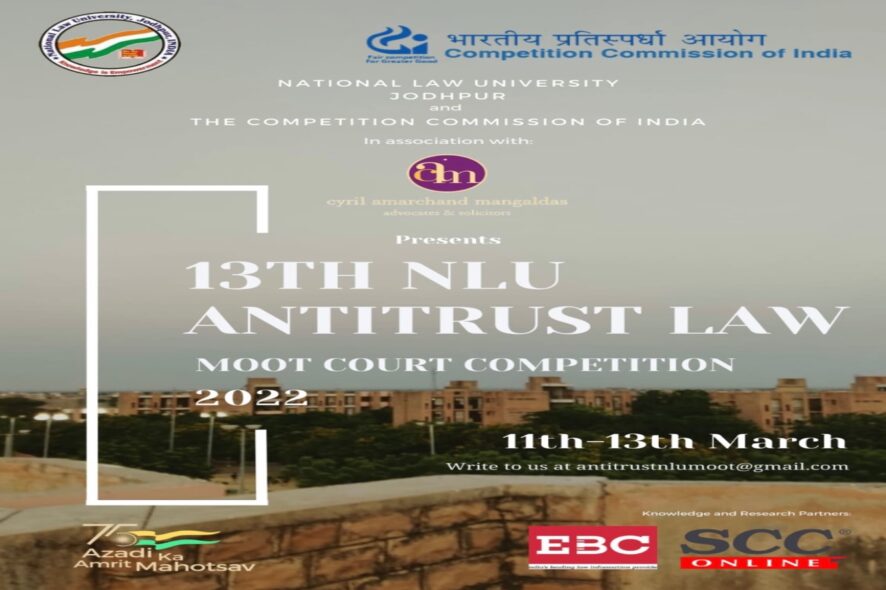Welcome to the 13th NLU Antitrust Law Moot Court Competition, 2022 organized by National Law University, Jodhpur.
The Competition is scheduled from March 11 – March 13, 2022 and is being organized under the patronage of the Competition Commission of India, in collaboration with Cyril Amarchand Mangaldas and our knowledge partners, SCC Online and Eastern Book Company. The Competition has always been known for its excellent mooting and judging, and this year, its bigger than ever, with 37 participating teams from some of the country’s most prestigious law schools.
We at NLU, Jodhpur believe that education unless and until complemented by intellectually invigorating challenges fails its purpose. Cognizant of this responsibility and with a vision to foster the advancement of learning and research in the field of competition law, we will ensure that this competition will help all participants hone their mooting skills along with exploring the nuances of competition law with an exciting and challenging proposition. The organizing team has left no stone unturned in their diligent endeavour to make this competition an enriching experience, this time virtually!
We welcome all the judges and the participants, and hope that we are able to make this a memorable event for all. The Moot Proposition revolves around contemporary issues in the field of competition law, including the role of sectoral regulators vis-a-vis the role of the competition authority. The proposition also entails challenging issues pertaining to cartelization and abuse of dominance by entities in the automotive manufacturing industry.
The competition is about to begin, and we will keep you updated on everything. For more information, you may also follow us on Instagram, Twitter, Linkedin, and Facebook.
Best wishes to all the participating teams!
DAY -1
9:00 AM – Inaugural Ceremony and Exchange of Memorials
The ceremony started with a welcome address by Ms. Rishika Arya, Convenor of the Moot Court Committee. Dr. I.P. Massey, Dean of Law, and Mr. Rohan C. Thomas, Chairperson of the Moot Court Committee, virtually inaugurated the 13th NLU Antitrust Law Moot Court Competition. With this, we start with the Competition. The participants’ queries have been answered and and exchange of memorials between the teams has taken place to the satisfaction of the participants.
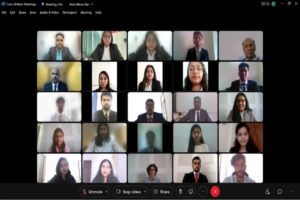
The Preliminary Rounds begin at 11 a.m. All the competing teams have our best wishes.
Judges Briefing
The judges for the Preliminary Rounds have been briefed, this time through e-mail. A comprehensive bench memorial and a condensed version of the memorial prepared by the Moot Court Committee were mailed to the judges. The judges for the rounds are distinguished legal experts in their fields. Our distinguished judges are here to assess each team’s understanding and command over the law.
11:00 AM – Preliminary Rounds
With an unfettering zeal, the Preliminary Round has taken off in full swing in all the courtrooms and the teams are presenting their arguments, which they have worked tirelessly on, in high spirits. The judges are actively attempting to dissect the counsels’ arguments and the questions pour in. The teams are well prepared and they answer the questions by citing the relevant law. Following the intense mooting session, the teams also present their respective rebuttals and sur-rebuttals
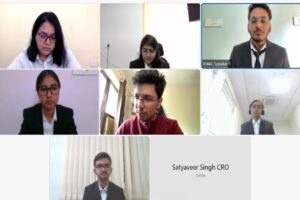
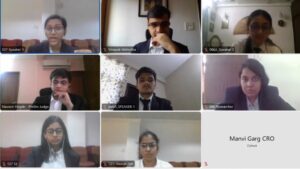
1:00 PM – End of Preliminary Rounds
The competition has taken off to a spirited start as we conclude our preliminary rounds. The teams await with bated breath for the Reverse Preliminary Rounds, which will start at 3 PM. Both these rounds together will determine which teams qualify for the Octa-Finals. We look forward to seeing the teams showcasing their talent! We wish all the teams the best of luck.
3:00 PM – Reverse Preliminary Rounds
All the teams are back on track with fresh energy and high spirits to present their arguments. In the Reverse Preliminary Rounds, the teams get to present arguments for the side opposite to the one they argued for in the preliminary round, to ensure fairness. The rounds are underway and the participants are putting forth some impressive arguments and showcasing their great mooting skills. May the best teams prevail!
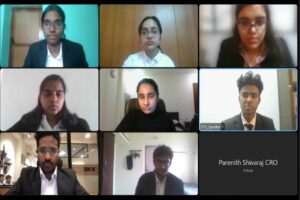
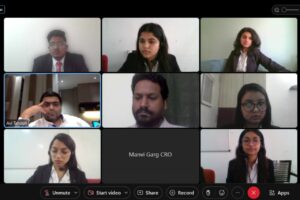
3:00 PM – End of Reverse Preliminary Rounds
The reverse preliminary rounds have also come to an end. The teams continued to showcase their great preparation with splendid performances. These rounds were just as heated as the preliminary rounds and with their culmination, the battle for the top 16 spots now stands concluded.
The wait for the results is finally over!
Here we present the top 16 teams that have qualified for the Octa Finals Round –
National Law University, Odisha
Symbiosis Law School, Hyderabad
Dr. Ram Manohar Lohiya National Law University, Lucknow
National Law School of India University, Bangalore
Institute of Law, Nirma University, Ahmedabad
Jamia Millia Islamia, New Delhi
Damodaram Sanjivayya National Law University, Vishakhapatnam
Gujarat National Law University
Army Institute of Law, Mohali
National University of Study and Research in Law, Ranchi
National Law Institute University, Bhopal
Hidayatullah National Law University, Raipur
Symbiosis Law School, Pune
Maharashtra National Law University, Nagpur
Tamil Nadu National Law School, Tiruchirapalli
NMIMS Kirit P Mehta School of Law, Mumbai
It has been an exhilarating experience so far. We excitedly await to see what tomorrow holds for us. Our best wishes to all the teams.
DAY – 2
It is the 2nd day as sixteen teams are ready and eager to fight it out in the Octa-Final Rounds of the 13th NLU Antitrust Law Moot Court Competition, 2022. The teams have had the night to prepare themselves and we look forward to some inspired rounds of mooting!
9:00 AM – Octa-Final Rounds
The stage is all set with the commencement of the exciting Octa-Final Rounds, with the teams pitted against one another for a thrilling show of events. We anxiously wait to find out which of the teams’ manage to keep their wits and make it to the next rounds of the Competition.
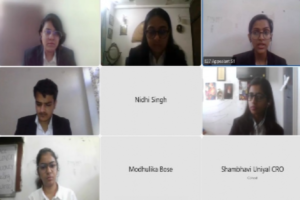
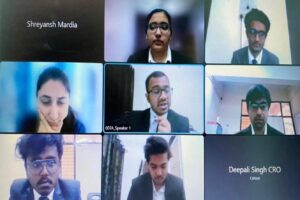
11:00 AM – End of Octa-Final Rounds
With the teams continuing to exhibit great argumentation and mooting skills, the Octa-Final Rounds have finally concluded.
Here are the teams qualifying to the Quarter Finals-
TNNLS Tiruchirappalli
National Law Institute University, Bhopal
Jamia Millia Islamia, New Delhi
Institute of Law, Nirma University, Ahmedabad
Army Institute of Law, Mohali
Symbiosis Law School Hyderabad
NLU Odisha
Symbiosis Law School, Pune
1:00 PM – 3:00 PM – Quarter-Final Rounds
The qualifying teams charge forward with zeal as the Quarter Final Rounds commence! The teams are well prepared and they answer the questions posed by the judges confidently by citing relevant legal provisions and precedents.
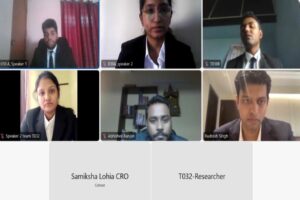
Quarter-Final Rounds
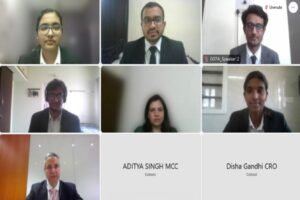
Quarter-Final Rounds
4:30 PM: The much awaited results of the Quarter-Final Rounds have been declared. Following a tremendous effort from everyone, the following teams have advanced to the Semi-Finals-
Army Institute of Law, Mohali
Symbiosis Law School, Pune
NLIU, Bhopal
Symbiosis Law School Hyderabad
5:00 PM – Semi-Final Rounds
Court Room – 1
Army Law Institute, Mohali versus Symbiosis Law School, Hyderabad was a fierce round of arguments and counter-arguments. The learned bench comprised of Mr. Abir Roy, Mr. Mohan Ronanki and Mr. Bharat Budholia. The round began with the team from Army Law Institute, Mohali presenting their arguments as Appellants. The first speaker for appellant dealt with the first and fourth issue. The counsel was grilled on the facts of the case as well as the similarity with issues and facts of the cases relied upon by the counsel in his speech. He handled the questions very well. The second speaker dealt with the second and third issue of the proposition. Counsel was questioned thoroughly regarding the applicable law and its applicability to the facts of the case. The appellants concluded with an extension of 12 minutes. Symbiosis Law School, Hyderabad then took over as Respondents. The first speaker addressed the first and second issue of the proposition. The counsel was grilled by all three judges regarding the jurisdiction of the competent court in the first issue. He handled all questions tactfully and the judges seemed satisfied by the reasoning provided. The second speaker dealt with the third and fourth issues. The judges at the outset stated the argument made by counsel for appellant and asked the counsel to rebut the same. The counsel handled all questions well. The Respondents concluded with an extension of 9 minutes. Fine speaking skills were put on display by all the participants. The teams showed a thorough knowledge of the law and cited various authorities to back their arguments. It was a closely contested round, adding to the anticipation of the results.
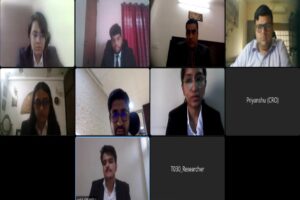
Semi-Final Rounds
Court Room – 2
The Court Room was charged with enthusiasm and energy as National Law Institute University, Bhopal and Symbiosis Law School, Pune competed against each other. The learned bench comprised of Mr. Rahul Rai, Mr. Rudresh Singh, and Ms. Sunaina Dutta. The round began with the team from Symbiosis Law School, Pune presenting their arguments as Appellants. Speaker 1 from the Appellant’s side argued on the anti-competitive nature of the agreement and the anti-competitive effect in the market for electric automobiles. Speaker 2 cited practical examples to support his arguments. Both the speakers cited strong authorities coupled with relevant facts to support their arguments. An extension of approximately 3 minutes was granted to both the speakers by the judges. National Law Institute University, Bhopal then took over as Respondents. Speaker 1 from the side of the Respondent began by arguing on monopoly in the relevant market and abuse of dominant position. Both the speakers were questioned on the case laws and other authorities that they had cited. The Counsels also demonstrated the harms caused by sharing sensitive information among the competitors. An extension of 3 minutes was granted to both the speakers by the judges. The rounds were indeed highly charged with display of excellent mooting skills and greatly nuanced legal arguments from both the parties.
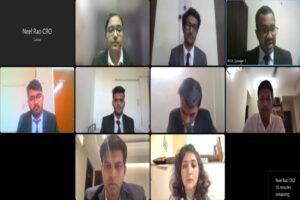
Semi-Final Rounds
7:30 PM: The much awaited results of the Semi-Final Rounds have been declared and the teams qualifying to the Final Rounds of the 13th NLU Antitrust Law Moot Court Competition, 2022 are –
National Law Institute University, Bhopal
Army Institute of Law, Mohali
With this, we come to the conclusion of Day 2. It has been an enthralling experience so far. We excitedly await to see what tomorrow holds for us. Our best wishes to all the teams.
DAY-3 – Final Rounds
Welcome Back to the 13th NLU Antitrust Law Moot Court Competition, 2022!
10:05 AM: The final rounds between Army Institute of Law Mohali and National Law Institute University, Bhopal are about to begin!The Final Round of the Competition is being judged by a varied panel of eminent lawyers and economists. Ms. Payal Malik is the Advisor and Head of the Economics Division at the Competition Commission of India. Dr. Geeta Gouri is a former Member of the Competition Commission of India. Prof. Harpreet Kaur is a Professor of Law and the Registrar of National Law University, Delhi. Mr. Ram Kumar Poornachandaran is a Partner at AZB & Partners. Mr. Yaman Verma is a Partner at Shardul Amarchand Mangaldas & Co.
10:09 AM: The final rounds have begun with the team from Army Institute of Law, Mohali presenting their arguments as Appellants. The first speaker for the Appellants begins with the first issue relating to jurisdiction. The speaker starts by citing the case of CCI v. Bharti Airtel, to argue that the sectoral regulator in the instant case i.e., TRAI should be given primacy in jurisdiction over the Competition Authority. The researcher assists the speaker by sharing the relevant paragraphs from the case compendium for the judges’ convenience. Before moving on to the second issue, the judges ask few questions and these are tackled skillfully and swiftly by the counsel!
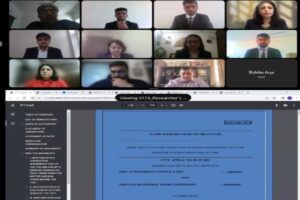
Final Rounds
10:20 AM: The judges are grilling the counsel on the legal aspects but he remains unfazed and answers the questions to the satisfaction of the judges. Dr. Geeta Gouri raises a pertinent question regarding necessity to look into the relevant market when discussing the issue surrounding the licensing arrangement.
10:40 AM: The counsel uses a pie chart to explain the market division in the automobile industry. The counsel argues that Eitri does not hold a dominant position in the relevant market. The counsel also argues that even if Eitri is found to be dominant, it has not abused its dominant position and that it has not employed predatory pricing. The counsel concludes and passes the baton to his co-counsel.
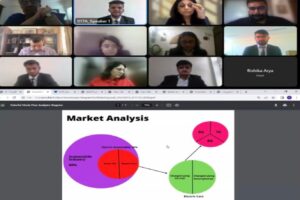
Final Rounds
11:05 AM: The second speaker takes the podium and starts presenting the arguments. The first issue that he deals with is whether Eitri has violated Section 3(4)(c) of the Competition Act, 2002. The speaker argues that the agreement between Eitri and Ultron does not impose an absolute restriction, and thus, is not violative of Section 3(4)(c). After a bout of questions from the judges, the counsel concedes that the JV does put a restriction, however, such restriction is reasonable.
11:30 AM: The speaker contends that Eitri is not dominant in the relevant market since the requisite thresholds are not met. Herein, Mr. Yaman Verma asks whether the market dominance of Ultron would be relevant while analysing a possible violation of Section 3(4), given that Ultron is the sole supplier of 8G UHF and the exclusive supply agreement with Eitri, proscribes other competitors to enter the market.
11:40 AM: Ms. Payal Malik asks the speaker to address the issue of whether there is distribution agreement between Eitri and Ultron, and whether there is any verticality i.e., whether Ultron and Eitri operate in the same level of production or not. The speaker answers that there is no verticality between the parties and cites relevant authorities.
11:48 AM: The Appellants after concluding their arguments on the fourth issue vis a vis violation of Section 3, rest their case. The Respondents have begun now.
11:50 AM: Speaker 1 starts with requesting the researcher to share the memo, and explaining the issue division. Speaker 1 begins with Issue 1 dealing with jurisdictional tussle between TRAI and NFTC. He starts by laying down the factual matrix relevant to his argument.
11:55 AM: Beginning with the first leg, the speaker submits that the Bharti Airtel case will not be applicable to the present case as issues before the Competition Authority and Telecom Regulator were inherently different. Ms. Payal Malik questions the speaker regarding necessity of delineating relevant market in this issue to which he answers that relevant market is of no consequence to the issue at hand.
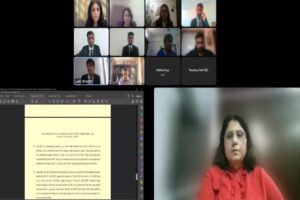
Final Rounds
12:10 PM: Ms. Geeta Gouri asks whether TRAI has the right to intervene in a licensing decision to which the speaker answers that the question would be discussed in detail by the second speaker. The speaker goes on to argue that principle of sub-judice will not be applicable, and relies on Steel Authority of India v. CCI case, and submits that the proceedings before TRAI are administrative, and not judicial or quasi-judicial in nature.
12:20 PM: Moving to Issue 4, the speaker relies on the Flashlights case and contends that there is a violation of Section 3 in the instant case. Ms. Payal Malik then questioned the speaker on the standard of evidence being presented and whether Whatsapp chats and emails are admissible. The speaker swiftly answered this question by stating that when we combine electronic and circumstantial evidence, that suffices to make it admissible. The speaker asks for extension of time, which is granted by the bench. Prof. Harpreet Kaur asks for a clarification on whether the effect of the JV on customers needs to be looked into to figure out pro -competitiveness. The Speaker answers stating that based on rule of reason under Section 19(3), benefits to customers needs to be examined, and states that there is no benefit accruing to consumers. The speaker then summarises his arguments and passes the baton to his co-counsel.
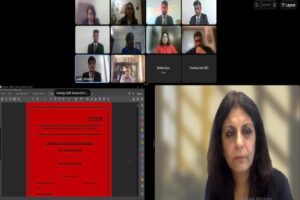
Final Rounds
12:40 PM: The Counsel starts by presenting arguments on Issue 2, which pertains to whether there is a violation of Section 3(4) of the Competition Act. Ms. Payal asks the speaker to provide the bench with precedents wherein there was no absolute restriction and reasonability of restriction was determined. The Speaker is also questioned on whether there was any other player in the market which had the capabilities of harnessing 8G for remote charging when the investigation was carried. The speaker states that there is no mention of presence of other competitors in the Proposition.
12:50 PM: Speaker 2 starts with Issue 3, which deals with abuse of dominance. First, the speaker states that in the electric automotive industry, the very fact that Eitri’s market share is over 50% shows that they are the dominant player. This Counsel submits that this coupled with the fact that there is dependence of consumers on Eitri helps in establishing dominant position. The speaker cites the Hindustan Coca Cola Beverages case to argue that high level of vertical integration leads to high level of dependence. Second, the speaker states that by application of the essential facilities doctrine, one cannot refuse access to an essential facility to other competitors and that in this case, the 8G facility is an essential facility, which is impossible to replicate because it is a completely different network spectrum. Concluding her arguments, the speaker submit that Sections 3 and 4 of the Competition Act have been violated by Eitri.
1:00 PM: REBUTTAL – The Speaker from the side of the Appellant states that the Respondents were unable to prove why the ratio of Bharti Airtel case will be inapplicable in the present case. The Speaker also states that the Respondents were unable to show how the JV was not efficient, other than the cost factor. The Counsel concludes on the note that market share alone is not sufficient for proving dominance.
SURREBUTTAL – The Speaker from the side of the Respondent address all the points raised in the Rebuttals. With respect to dominance, they state that apart from market share, there are other factors as well, such as vertical integration by Eitri and dependence of consumers.
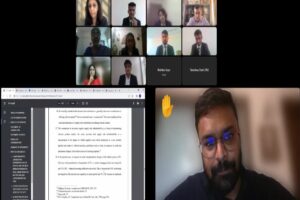
With this, we come to the conclusion of the Final Rounds of the 13th NLU Antitrust Law Moot Court Competition, 2022. What an engaging session it has been, with the judges asking interesting and pertinent questions, to test the knowledge and the depth of research undertaken by the parties. The Results will be announced in the Valedictory Ceremony, which will commence at 3:00 PM today. We look forward to seeing you there!
3:00 PM – Valedictory Ceremony
The moment you all have been waiting for is finally here! After months of research, practice, and hard work, the winning team gets to take it all! The following are participants that have emerged victorious at the rounds!
Winning Team: Team 006 (Army Institute of Law, Mohali)
Runners-Up Team: Team 017 (NLIU, Bhopal)
Best Memoranda: Team 009 (NLU, Odisha)
Best Student Advocate: Palak Jagetia (RMLNLU)
Second Best Student Advocate: Swechchha Singh (RMLNLU)
Best Student Advocate of the Finals: Ranjul Malik (Army Institute of Law, Mohali)
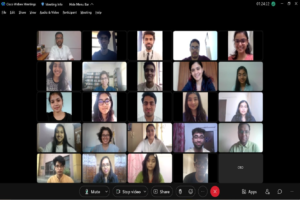
This marks the conclusion of the 13th NLU Antitrust Law Moot Court Competition, 2022. This edition of the Anti-trust Moot Court Competition was like none other before! It had us tackling new challenges on almost every front. With this edition, we reached a new milestone and were able to livestream the Final Rounds on Youtube for all viewers! The successful completion of the event, leaves us wishing we had the warm opportunity of hosting the judges and the teams on campus. We hope that during the course of the Competition, the participants found chances to grow, and developed fondness for the law. At the end of these three days, we sincerely hope that we have been able to deliver the expectations that the participants and the judges had from us. See you all next year, but hopefully not virtually!



